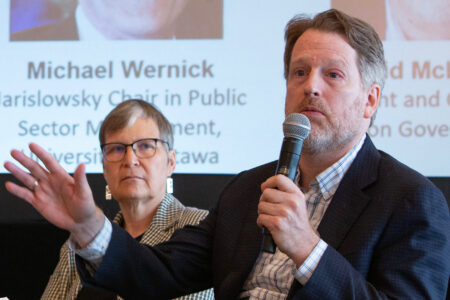
There is never any shortage of public opinion polls on the eve of an election. A steady stream of data sets up the electoral contest by gauging who is starting in a leading position and who is lagging at the back of the pack.
The main limitation of this type of “horserace” data is that it doesn’t help us anticipate what might happen next. To get a good sense of how the campaign might unfold, we need to know more about the public’s mood – what citizens are feeling good about, and what is keeping them from getting a good night’s sleep. Not that broader survey data on issues and outlook can foretell the eventual outcome with any degree certainty. Human actions and reactions will always disrupt the expected course of events, especially during election campaigns. But a good understanding of the wider context of public opinion on the eve of an election should minimize the extent of our surprise at what ultimately transpires.
This applies, for example, to the issue of inclusive growth – the notion that economic growth and the equitable distribution of its benefits should be seen as mutually reinforcing rather than mutually exclusive policy objectives. Talk of inclusive growth has animated international forums such as the Organization for Economic Co-operation and Development and the World Economic Forum for much of the last decade. In Canada it was a central preoccupation of the federal Liberal government that was elected in 2015.
While the term inclusive growth has only recently moved into the vernacular, we can still ask whether, as the government sought a second mandate in 2019, the public was feeling more or less included in the country’s prosperity, and whether historic fissures in Canadian society seem to be widening or closing.
At first glance, the data suggest that the public should have been fairly receptive in October 2019 to the incumbent Liberal government’s claim to have made growth more inclusive. At that time the proportion of Canadians citing the economy as the country’s most important problem had declined to 14 percent, the lowest level since the onset of the financial crisis in 2008. More Canadians were feeling positive about both the country’s and their own economic situation. The proportion of Canadians saying that it was a good time to find a job in the area where they live had jumped from 36 percent in 2015 to 61 percent in 2018. And the proportion describing their own incomes as inadequate had dropped 10 points (from 39 percent to 28 percent) over the course of the Liberals’ first mandate. As they headed back to the polls, they could hardly have wished for more (figure 1).
All these numbers, however, reflect national trends, and they obscure contrasting regional ones. The modest 5-point increase since 2014 in the proportion of Canadians with a favourable view of the country’s economic situation subsumed the much larger 22-point increase in Quebec, and a counter-acting 22-point drop in Alberta. In fact, over the course of five years (between 2014 and 2019 – a relatively short space of time), Quebec and Alberta had essentially switched places: in 2014 Quebec was the least economically optimistic and Alberta the most optimistic province; the reverse was true in 2019.
In Canada, the issue of inclusive growth is not just about equity across social groups, it is also about equity across regions. Framed in this way, it was less of a “winning issue” for the incumbent government than they might otherwise have expected (figure 2).
No one who had these Alberta numbers in full view, then, would have been surprised that the Liberals were shut out of the province in terms of seats come election night. But the flip side of the story is also important. Going into the 2019 election campaign, it would have been useful if the opposition parties had thought harder about what they were offering voters in Quebec. This might have prompted them to go beyond a pitch based on the premise of how much harder it was getting to make ends meet. (At the city level, affordable housing and the rising cost of living were top issues for those living in Toronto and Vancouver, but not Montreal.)
A sober review of public opinion data as they pertain to notions of inclusion also helps explain something that didn’t happen during the 2019 election campaign. In the wake of increases in the number of refugees “irregularly” crossing the Canada-US border in Quebec and Manitoba, and the launching of the Maxime Bernier’s People’s Party of Canada, which had an overtly anti-immigration platform, the risk that immigration would emerge as a defining (and divisive) election issue appeared high. But it did not become a defining issue, largely because, in spite of some heated rhetoric on talk radio and social media, Canadians themselves have never felt more positively about immigration than they did on the eve of the 2019 campaign.
The proportion of Canadians who say there is too much immigration in Canada was trending downward, as was the proportion questioning the legitimacy of refugee claimants (figure 3). While in 2018 and the spring of 2019 one in two Canadians agreed that too many immigrants do not adopt Canadian values, this was the lowest figure ever recorded (in 1993, three in four Canadian held this view). Perhaps most importantly, heading into the election, in April 2019, only 3 percent of Canadians felt that immigration was the most important issue facing the country (a proportion that was nine times lower as that in the United States).
Further analysis also reveals that attitudes on immigration in Canada correlate less strongly with economic concerns than they do with general political outlook (that is to say, ideology). So despite the overall brighter mood in 2019, plenty of Canadians were anxious about the economy and their own financial situation as election day approached. But this anxiety propelled them to blame Ottawa insiders, not newly arrived outsiders. In retrospect, then, the table was not set for a heated debate about immigration, and it should have come as no surprise that the more a party pushed this issue to the fore, the worse they did on election night.
Looking back, however, there was one signal in the pre-election polls that might have warranted more attention. While fewer Canadians were expressing concerns about the economy, more were expressing concerns about the environment – and specially about climate change. In fact, by the spring of 2019, climate change had overtaken the economy as the top issue for Canadians for the first time since the onset of the economic crisis in 2008. That said, in spring 2019, the proportion of Canadians singling out climate change as their top issue was only 14 percent – up from 5 percent two years earlier, and tied in order of importance with the similar proportion expressing concern about the quality of government leadership.
At that time, there was no way of knowing whether the share of Canadians preoccupied with climate change was already peaking or just beginning to grow. It took a subsequent survey, conducted during the election campaign, to reveal the answer. We now know that the priorities of Canadians were evolving quickly over the course of 2019; by October, the proportion citing climate change as the country’s top problem had jumped a further 10 points, to reach 24 percent, while the proportion concerned with the either the economy or government leadership continued to fade. This trend was especially pronounced in Quebec, where the proportion preoccupied by climate change doubled from 18 percent to 37 percent between the spring and fall of 2019
So, heading into the 2019 election, Quebecers were less concerned about the economy or the cost of living than other Canadians – a pattern that the pre-election survey data made clear. What could perhaps have been better anticipated was the extent to which this was creating space for climate change to emerge as one of the defining issues of the campaign, in Quebec and beyond.
In retrospect, the election campaign was decided more by the issue of sustainable growth – the question of how to balance economic and environmental imperatives – than by that of inclusive growth, which is perhaps why the opposition parties’ strategy of approaching the carbon tax mostly as a pocket-book issue had limited appeal.
This article is part of the Ensuring inclusive prosperity when all boats aren’t being lifted special feature.
Photo: Shutterstock, by Moomusician.
Do you have something to say about the article you just read? Be part of the Policy Options discussion, and send in your own submission. Here is a link on how to do it. | Souhaitez-vous réagir à cet article ? Joignez-vous aux débats d’Options politiques et soumettez-nous votre texte en suivant ces directives.









